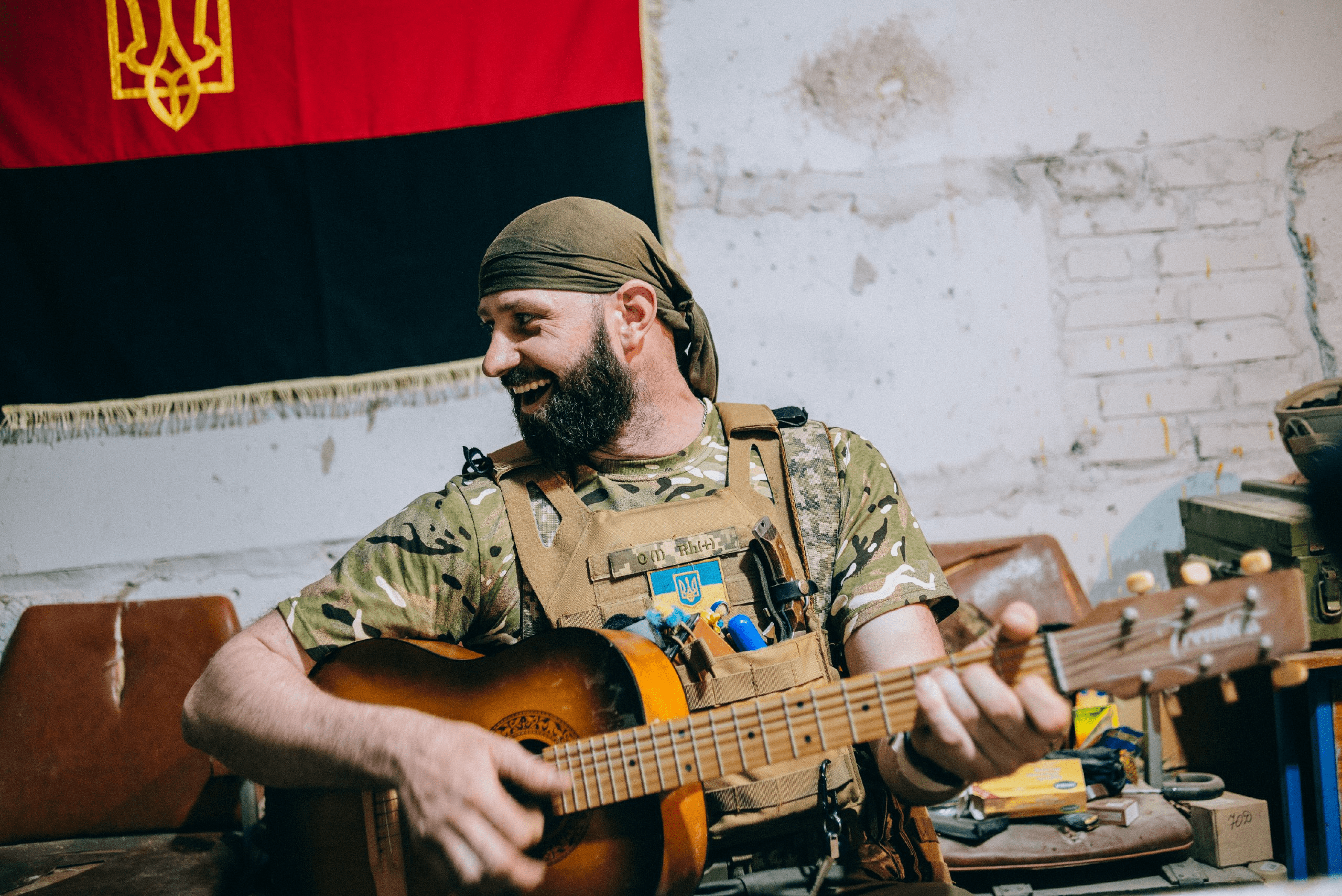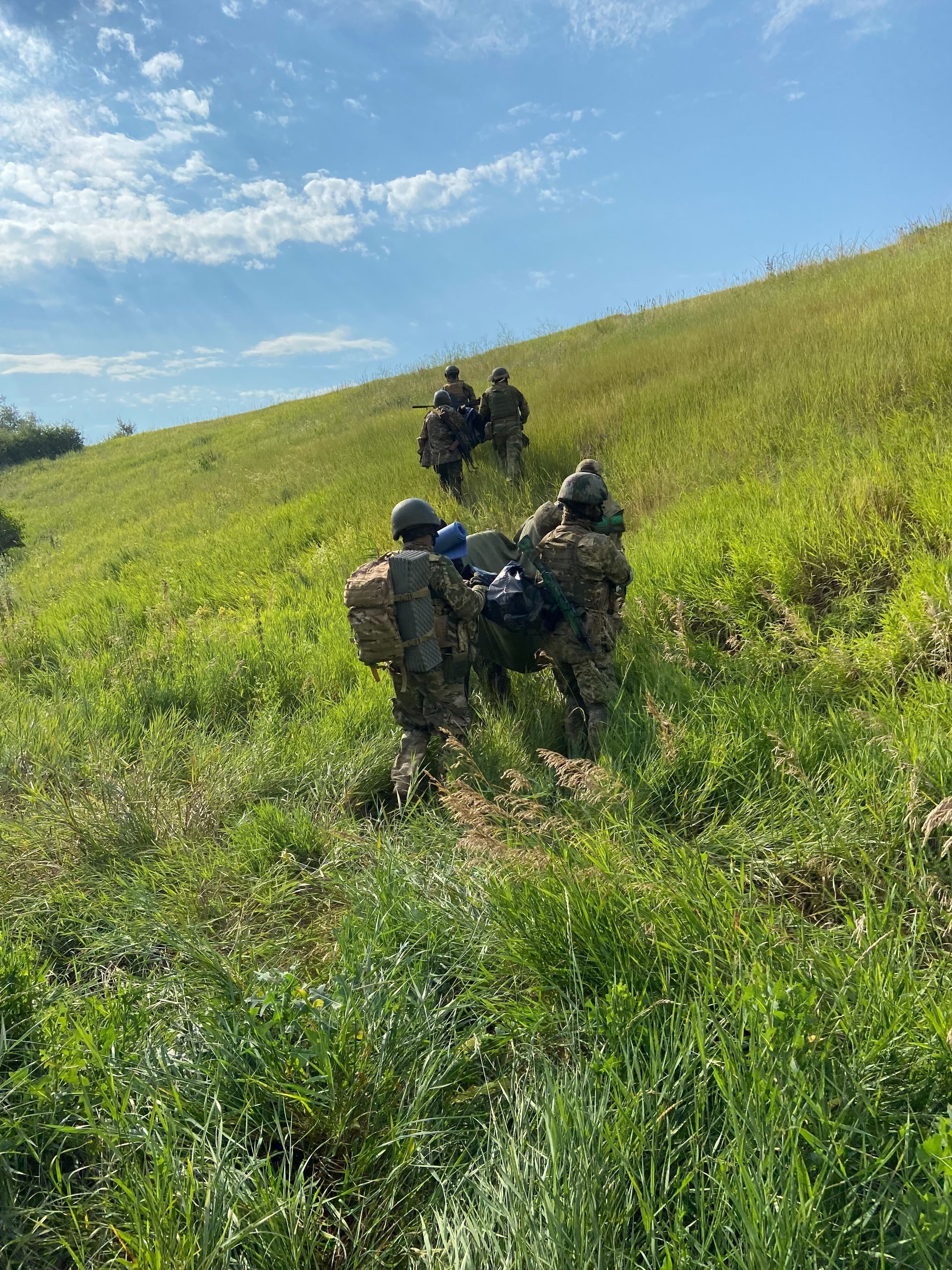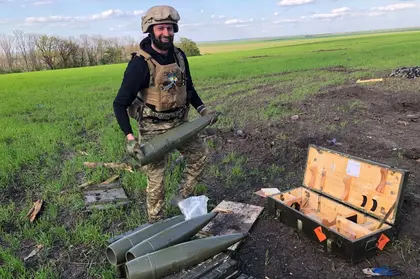The Russians have become very active now in the Donestk region, said Volodymyr Hapun, a soldier of the Carpathian Sich battalion fighting near Kreminna.
“Recently, it has been relatively quiet,” Hapun told Kyiv Post, “but there were severe artillery attacks today in the morning. We are currently on the defensive and are doing our best to prevent the enemy from recapturing the positions we took back in October.”
- See the most contemporary Ukraine news reports for today.
- See the most contemporary Ukraine news reports for today.
JOIN US ON TELEGRAM
Follow our coverage of the war on the @Kyivpost_official.
According to the rifleman, the Russian strategy is to advance in small groups with equipment attempting “to capture our positions.” When the Ukrainians repel these attacks, the Russians use scorched-earth tactics, he said.
“They choose one position and cover it with artillery as much as possible, destroying all shelters and trenches and simply wiping everything off the face of the earth. When our military has nowhere to hold the line and nowhere to hide, we have to withdraw from the position,” Hapun said. “The Russians dig in there, even though they may lose a significant number of their own personnel.”
The Ukrainian Armed Forces serviceman explained in a phone interview with Kyiv Post that the units on the frontlines face Russian forces that freely expend human capital, in contrast with Ukrainians who “can’t afford that kind of attrition because we cherish every soldier,” he said. “We have to use different strategies, ideas, and planning than we did during the Second World War when waves of people were thrown once more unto the breach to gain some ground.”

Zelensky Meets CIA Director William Burns in Ukraine
Hapun’s battalion was formed originally as a unit of volunteer fighters in the defense of Kyiv. Now, officially incorporated as the 49th Rifle Battalion, the unit is tasked with defending the Kreminna sector – which the army classes as being in the Donetsk sector of Ukraine – rather than conducting offensive actions elsewhere.
Whom are you fighting, Wagner mercenaries or the Russian army?
Now, Russian troops are fighting us. A month and a half ago, Wagner's groups came in, but not in the same numbers as in Bakhmut. Their advance here was unsuccessful, and we understand that Wagner's men decided to concentrate all their forces in Bakhmut.
Have you taken any prisoners of war?
We had to take a lot of prisoners in Kyiv, Kharkiv, and the Donetsk regions.
At first, when they were captured on the front, they said that they had simply been deceived, and are just ordinary soldiers. But when we started interrogating them, it turns out that they are officers who know precisely where they are going and what their tasks are.
In addition to fighting in order to make money, they are so saturated with either propaganda or so nationalistic about their way of life that they do not accept the Ukrainian nation and people. They aim to destroy the ‘neo-fascists,’ or whatever they call us. They have a state policy that Ukraine as a nation should not exist, and that Ukrainians are a people who should not be allowed to live.
Volodymyr's Hapun unit using a Russian captured tank on the frontline.
The Russian army is well equipped, and they should not be underestimated. They are learning as the war goes on. Compared to the beginning of the full-scale invasion in February and March in the Kyiv region, now, a year later, they are already actively using quadcopter drones like the kind the Chinese make.
Also, the Russians have a lot of artillery systems, including the Russian heavy flamethrower Soncepyok systems in our sector, and a lot of large-caliber artillery, such as Smerch and Uragan systems.
They are not running out of ammunition and we cannot compete with them. It’s clear from the amount of ammunition used that they have an advantage here. Unfortunately, we do not have enough ammunition. This means the Russians have more means and resources to conduct offensive actions.
However, we have also gained experience, so we plan our operations more carefully to preserve ammunition and successfully repel enemy attacks, but the further we advance, the more difficult it is.
Since the beginning of the war, we have lost more than 70 comrades, which is very difficult. The death of my commander, Oleh Kutsyn, who is also my godfather, struck me the hardest. It happened on June 19 in the Kharkiv region, when we were holding Izyum and our battalion was there as volunteers.
When it happened, I was nearby. The Russians fired upon us with cluster munitions from Grad systems. I was wounded and bruised, thrown back by the blast wave. I had shrapnel wounds, but managed to survive.
We lost our commander and three of our comrades, which was very demoralizing. Our battalion is like a family, we all know each other personally, some of us for many years.
Funny things also happened when we held down a section of the Kharkiv region where should have been two or three units [200-300 fighters], but we were left only with 49 men, because many could not withstand such shelling and tank attacks, both psychologically and physically. In a volunteer battalion, soldiers can refuse to serve and go home, so this happened.
Despite this, 49 of us, instead of 300, held that section of the frontline and did not take a single step back. We heard the Russians talking on their radios, saying that they could not break through the defenses of the Carpathian Sich because there were up to ‘three thousand Nazis’ there, as they called us. We laughed a lot at this because these were unrealistic figures and it raised our morale.
 Volodymyr Hapun, a soldier of the Carpathian Sich battalion fighting near Kreminna.
Volodymyr Hapun, a soldier of the Carpathian Sich battalion fighting near Kreminna.
Also, when we were already advancing on Izyum, we set up our checkpoints on the roads, because there were still many Russians there, and a Russian armored vehicle with soldiers came up to one of our checkpoints. They did not understand that this territory was already controlled by the Ukrainian Armed Forces and asked:
“Guys, tell how to get to our forces in Izyum,” and we told them that they had already arrived. We took prisoners and their equipment replenished our resources.
Do you have enough weapons?
We have enough small arms, but the current war is not a war of small arms, especially in our sector. We are standing in the forests and fields and this is now a war of artillery, tanks and mortars. Unfortunately, there is a lack of ammunition for these types of weapons, as well as tank shells and mines.
At the same time, we also have the latest weapons: 777s, 175-caliber Howitzers, and HIMARS. [Mostly from Western supporters] this weaponry is very effective and very much needed at the front. Still, we need more of it and more ammunition to repel and suppress enemy fire, seizing the initiative and offensive. The sooner our Western partners help by providing more of these weapons, the sooner we will push the occupiers from our land.
Volunteers are a significant help. We could not have done it without their assistance, especially in the first days of the full-scale invasion. Volunteers ensured the victorious battles in the Kyiv region.
They are our everything. Without their help, we would not have been able to fight. Only weapons are provided by the Armed Forces, but the helmets, body armor, clothing, all technical equipment, quadcopters, cars, and food are supplied by volunteers. It is an amazing phenomenon how volunteers provide for our army.
Are there any residents left in your unit’s sector?
In the frontline areas, everything has been destroyed, and there are almost no residents because there is nowhere to live. But, 15-20 kilometers from the front line, there are people in the settlements.
 Soldiers of the Carpathian Sich battalion carrying a body of a dead comrade.
Soldiers of the Carpathian Sich battalion carrying a body of a dead comrade.
Some of them are pro-Russian, and when you start talking to them, you hear condescending comments about the Russian occupation because the Russians have occupied these areas since March, and we liberated them.
Not everyone welcomed us here when we were liberating our land, but some people still came and brought us treats. It's hard to understand because Russian missiles destroyed their houses, killed their children, and yet they are still pro-Russian. This is how propaganda works.
Of course, we help the local population both with food and physical needs. So, I think eventually, they will realize who is who.
How long do you think the war will last?
On the ground, I see no quick victory in sight. There is no reason to think there will be a quick victory. Those who are fighting now do not have unlimited resources, it is a brutal war, and they will need to be replaced because the war is now at its peak.
Every man who can hold a weapon, who understands that we have to defend our land, should be ready to fight at the front.
You can also highlight the text and press Ctrl + Enter






